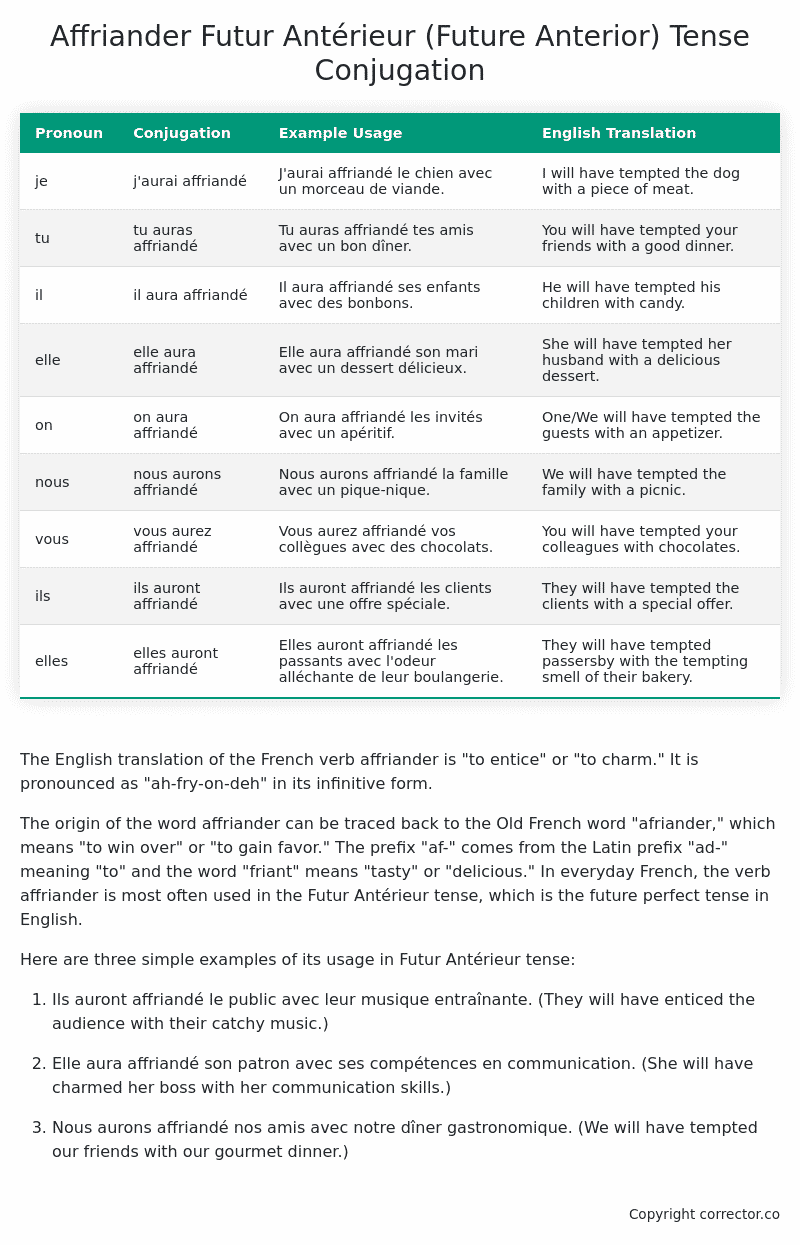Futur Antérieur (Future Anterior) Tense Conjugation of the French Verb affriander
Introduction to the verb affriander
The English translation of the French verb affriander is “to entice” or “to charm.” It is pronounced as “ah-fry-on-deh” in its infinitive form.
The origin of the word affriander can be traced back to the Old French word “afriander,” which means “to win over” or “to gain favor.” The prefix “af-” comes from the Latin prefix “ad-” meaning “to” and the word “friant” means “tasty” or “delicious.” In everyday French, the verb affriander is most often used in the Futur Antérieur tense, which is the future perfect tense in English.
Here are three simple examples of its usage in Futur Antérieur tense:
-
Ils auront affriandé le public avec leur musique entraînante. (They will have enticed the audience with their catchy music.)
-
Elle aura affriandé son patron avec ses compétences en communication. (She will have charmed her boss with her communication skills.)
-
Nous aurons affriandé nos amis avec notre dîner gastronomique. (We will have tempted our friends with our gourmet dinner.)
Table of the Futur Antérieur (Future Anterior) Tense Conjugation of affriander
| Pronoun | Conjugation | Example Usage | English Translation |
|---|---|---|---|
| je | j’aurai affriandé | J’aurai affriandé le chien avec un morceau de viande. | I will have tempted the dog with a piece of meat. |
| tu | tu auras affriandé | Tu auras affriandé tes amis avec un bon dîner. | You will have tempted your friends with a good dinner. |
| il | il aura affriandé | Il aura affriandé ses enfants avec des bonbons. | He will have tempted his children with candy. |
| elle | elle aura affriandé | Elle aura affriandé son mari avec un dessert délicieux. | She will have tempted her husband with a delicious dessert. |
| on | on aura affriandé | On aura affriandé les invités avec un apéritif. | One/We will have tempted the guests with an appetizer. |
| nous | nous aurons affriandé | Nous aurons affriandé la famille avec un pique-nique. | We will have tempted the family with a picnic. |
| vous | vous aurez affriandé | Vous aurez affriandé vos collègues avec des chocolats. | You will have tempted your colleagues with chocolates. |
| ils | ils auront affriandé | Ils auront affriandé les clients avec une offre spéciale. | They will have tempted the clients with a special offer. |
| elles | elles auront affriandé | Elles auront affriandé les passants avec l’odeur alléchante de leur boulangerie. | They will have tempted passersby with the tempting smell of their bakery. |
Other Conjugations for Affriander.
Le Present (Present Tense) Conjugation of the French Verb affriander
Imparfait (Imperfect) Tense Conjugation of the French Verb affriander
Passé Simple (Simple Past) Tense Conjugation of the French Verb affriander
Passé Composé (Present Perfect) Tense Conjugation of the French Verb affriander
Futur Simple (Simple Future) Tense Conjugation of the French Verb affriander
Futur Proche (Near Future) Tense Conjugation of the French Verb affriander
Plus-que-parfait (Pluperfect) Tense Conjugation of the French Verb affriander
Passé Antérieur (Past Anterior) Tense Conjugation of the French Verb affriander
Futur Antérieur (Future Anterior) Tense Conjugation of the French Verb affriander (this article)
Subjonctif Présent (Subjunctive Present) Tense Conjugation of the French Verb affriander
Subjonctif Passé (Subjunctive Past) Tense Conjugation of the French Verb affriander
Subjonctif Imparfait (Subjunctive Imperfect) Tense Conjugation of the French Verb affriander
Subjonctif Plus-que-parfait (Subjunctive Pluperfect) Tense Conjugation of the French Verb affriander
Conditionnel Présent (Conditional Present) Tense Conjugation of the French Verb affriander
Conditionnel Passé (Conditional Past) Tense Conjugation of the French Verb affriander
L’impératif Présent (Imperative Present) Tense Conjugation of the French Verb affriander
L’infinitif Présent (Infinitive Present) Tense Conjugation of the French Verb affriander
Struggling with French verbs or the language in general? Why not use our free French Grammar Checker – no registration required!
Get a FREE Download Study Sheet of this Conjugation 🔥
Simply right click the image below, click “save image” and get your free reference for the affriander Futur Antérieur tense conjugation!

Affriander – About the French Futur Antérieur (Future Anterior) Tense
Construction
Common Everyday Usage Patterns
Interactions with Other Tenses
For example
Summary
I hope you enjoyed this article on the verb affriander. Still in a learning mood? Check out another TOTALLY random French verb conjugation!


